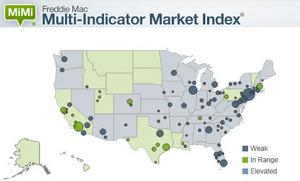Housing Stability Index Adds 50 Additional Metro Markets

MCLEAN, VA--(Marketwired - Apr 22, 2015) - Freddie Mac (OTCQB: FMCC) today released its updated Multi-Indicator Market Index® (MiMi®) showing the U.S. housing market continuing to stabilize and getting back on track heading into the spring homebuying season after a slight stumble last month. The latest release of MiMi now tracks the top 100 metro housing markets across the country. Of the top 100 metro areas, 60 percent are showing an improving three-month trend.
News Facts:
- The national MiMi value stands at 74.7, indicating a weak housing market overall and showing a slight improvement (+0.65%) from January to February and a three-month improvement of (+0.30%). On a year-over-year basis, the national MiMi value has improved (+3.53%). The nation's all-time MiMi high of 121.7 was April 2006; its low was 57.4 in October 2010, when the housing market was at its weakest. Since that time, the national MiMi value has made a 31 percent rebound.
- Fourteen of the 50 states plus the District of Columbia have MiMi values in a stable range, with North Dakota (95.7), the District of Columbia (94.8), Hawaii (90.7), Montana (89.2), and Wyoming (85.7) ranking in the top five.
- Eighteen of the 100 metro areas have MiMi values in a stable range, with Honolulu (91.8), Fresno (90.0), Austin (87.4), McAllen, TX (85.9), and Los Angeles (85.5) ranking in the top five.
- The most improving states month-over-month were Oregon (+2.19%), Michigan (+1.71%), Florida (+1.52%), California (+1.35%) and Kentucky (+1.19%). On a year-over-year basis, the most improving states were Nevada (+11.40%), Colorado (+9.60%), Florida (9.14%), Oregon (+8.31%), and Rhode Island (+7.97%).
- The most improving metro areas month-over-month were Detroit (+2.49), Fresno (+2.16%), Portland (+2.09%), New Orleans (+1.69%) and Milwaukee (+1.67%). On a year-over-year basis, the most improving metro areas were Stockton (+14.15%), Las Vegas (+12.28%), Denver (+11.62%), Palm Bay, FL (+11.11%), and Detroit (+10.94%).
- In February, 23 of the 50 states and 64 of the 100 metros were showing an improving three month trend. The same time last year, 46 states plus the District of Columbia, and 92 of the top 100 metro areas were showing an improving three-month trend.
Quote attributable to Freddie Mac Deputy Chief Economist Len Kiefer:
"By adding an additional 50 metro markets to the monthly MiMi we are able to capture greater insights into what's moving local housing markets heading into the spring homebuying season. The good news is after a slight stumble last month, nearly 60 percent of all markets are improving. Also, of the top 100 metro areas, over 60 are showing purchase applications up from the same time last year with over 20 of those metro areas showing double-digit percentage increases."
"Likewise, the employment picture continues to improve in most markets helping to support greater interest in purchasing a home. For example, in markets like Fresno, California, Provo, Utah, and Portland, Oregon, the employment picture continues to improve, homebuyer affordability is also strong, and we're seeing purchase applications up nearly 20 percent compared to the same time last year. Even in markets like Seattle where the inventory of for-sale homes is low and affordability is being challenged, we're still seeing a slight pickup in purchase applications over the past three months. However, we are beginning to see flat to slowing purchase applications in those energy states being affected by lower oil prices."
The 2015 MiMi release calendar is available online.
MiMi monitors and measures the stability of the nation's housing market, as well as the housing markets of all 50 states, the District of Columbia, and the top 100 metro markets. MiMi combines proprietary Freddie Mac data with current local market data to assess where each single-family housing market is relative to its own long-term stable range by looking at home purchase applications, payment-to-income ratios (changes in home purchasing power based on house prices, mortgage rates and household income), proportion of on-time mortgage payments in each market, and the local employment picture. The four indicators are combined to create a composite MiMi value for each market. Monthly, MiMi uses this data to show, at a glance, where each market stands relative to its own stable range of housing activity. MiMi also indicates how each market is trending, whether it is moving closer to, or further away from, its stable range. A market can fall outside its stable range by being too weak to generate enough demand for a well-balanced housing market or by overheating to an unsustainable level of activity.
For more detail on MiMi see the FAQs. The most current version can be found at FreddieMac.com/mimi.
Freddie Mac was established by Congress in 1970 to provide liquidity, stability and affordability to the nation's residential mortgage markets. Freddie Mac supports communities across the nation by providing mortgage capital to lenders. Today Freddie Mac is making home possible for approximately one in four home borrowers and is one of the largest sources of financing for multifamily housing. Additional information is available at FreddieMac.com, Twitter @FreddieMac and Freddie Mac's blog FreddieMac.com/blog.
The financial and other information contained in the documents that may be accessed on this page speaks only as of the date of those documents. The information could be out of date and no longer accurate. Freddie Mac does not undertake an obligation, and disclaims any duty, to update any of the information in those documents. Freddie Mac's future performance, including financial performance, is subject to various risks and uncertainties that could cause actual results to differ materially from expectations. The factors that could affect the company's future results are discussed more fully in our reports filed with the SEC.
